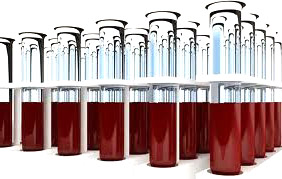Blood test results software
 Published: 16 Apr 2023
Published: 16 Apr 2023

Here the transport of the nutrients, oxygen and other beneficial substances occurs from the source organs to the cells via blood and likewise the transport of waste materials, metabolites, harmful gases (including CO2) occur from the cells to the blood. The clot hence formed as a result of this process seals an open wound in order to stop bleeding and prevents blood loss. It basically is a specialized bodily fluid that delivers necessary substances to the cells of the body. Other than imparting immunity to the organism, the blood is also very important in the self repairing mechanism of the body called as Coagulation. As a fluid connective tissue, messenger and transporter the blood also performs the transport of hormones and the signaling of tissue damage.It plays a major role in the defense mechanism of the body. Blood performs many immunological functions like circulation of white blood cells, and detection of foreign material by antibodies. Other than the basic transportation function of the supply of oxygen, nutrients and removal of wastes there are also some very vital biological functions performed by the blood. The transport of vital nutrients, oxygen, and drugs and even the waste material, gases etc occur in the body through a liquid connective tissue. Clotting helps repair and heal the injuries on the surface of the body (and also inside the body).
Blood tests are usually done to check how your body copes with illness, injury, inflammation, infection and some types of medication. If you're having an NHS health check, your blood test is usually a quick finger prick test that looks at the blood's glucose and cholesterol levels. If blood test results are abnormal, it gives the doctors a good indication of how to treat you or prevent problems occurring in the future.
This may be done in hospital or by your GP or practice nurse. If the results are higher than recommended, you may be asked to go to your hospital for a full blood test.
Usually, the blood bottles contain small amounts of a chemical to stop your blood clotting in the tube, so it can be measured accurately in the lab. A test for troponin can help to diagnose a heart attack, and a test for brain natriuretic peptide (BNP) can help diagnose heart failure.
If you take warfarin, your INR level (a measure of how quickly your blood will clot) will be tested regularly to make sure that you are prescribed the correct dose.Then they are taken to be analysed.
Blood tests can be used for many different things, including to check cholesterol and blood glucose levels. Blood needs a very precise balance in order for your body to work well. Each bottle is labelled with your name, date of birth and hospital number, when the blood was taken, and has a different coloured top according to the type of test. These help monitor your risk of heart and circulatory diseases and diabetes, or how your condition is being managed.
Tests for different chemicals and proteins can indicate how your liver or kidneys are working.